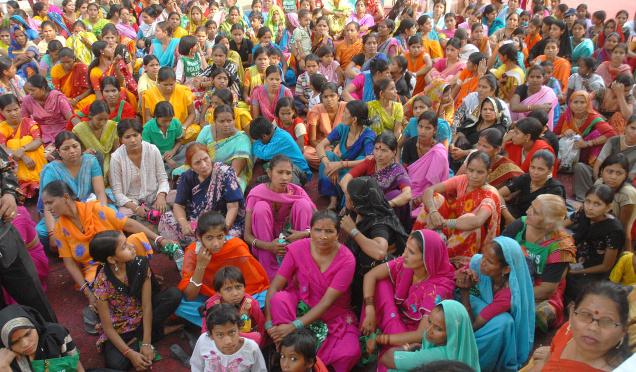THE OTHER HALF :----
The Hindu
What now? Photo: S. Subramanium
The Hindu
04/08/2013.
OPINION » COLUMNS » KALPANA SHARMA
July 20, 20
THE OTHER HALF :----
--------------------------
{ The forgotten bill }
BY KALPANA SHARMA
It’s important that the Women’s Reservation Bill becomes law so that more women find a place in Parliament and in the State assemblies:
.....................................................................................................................
It should be renamed the Forgotten Bill. The Women’s Reservation Bill, also known as the 108 Constitutional Amendment Bill 2008, has been up in the air for so long that it has virtually vanished into thin air.
Of course, officially it still exists. The Rajya Sabha passed it in 2010. As a result, it remains on the record and will not be sent back to the drawing board once a new government is elected.
But before it becomes law, and 33 per cent seats are reserved for women in Parliament and State assemblies, it still has to cross several hurdles. It must be passed by the Lok Sabha and by over half the State assemblies.
Clearly, this is not going to happen for some time. Or so it appears given current political realities. Political parties are now in election mode. And the ruling coalition at the Centre cannot take any chances. So I would guess that the bill will remain in limbo for a while yet. The passage through the Rajya Sabha was not entirely without drama. The bill received 191 votes in support and only one against it, that of Sharad Joshi of the Swatantra Bharat Paksh. The front pages of newspapers on the day after it was passed showed former Rajya Sabha deputy chairperson Najma Heptullah, Sushma Swaraj of the Bharatiya Janata Party (BJP) and Brinda Karat of the Communist Party of India (Marxist) joining hands and smiling jubilantly. But in the House the opponents to the bill made sure their voices were heard. In fact, four members of the Samajwadi Party (SP), one each from Janata Dal (United), the Rashtriya Janata Dal (RJD) and the Lok Jan Shakti Party had to be physically removed from the House. The Bahujan Samaj Party (BSP) also walked out without voting. Despite this the bill was passed.
The odd thing is that this government has the numbers on its side to be able to steer the bill through the current Lok Sabha. All the major parties are supporting the bill. Apart from the Congress Party, the Nationalist Congress Party (NCP), the BJP, the Left Front, the DMK and the AIADMK support the bill. Mamata Banerjee’s Trinamool is ambivalent as are the BSP and the JD (U). But even without their support, the bill would pass.
So what is the hitch? As in the past, it is politics and political calculations. Two parties who otherwise support the United Progressive Alliance (UPA) government — Mulayam Singh’s SP and Lalu Prasad Yadav’s RJD — are bitterly opposed to the Women’s Bill. The UPA government cannot risk losing their support with the approaching elections.
And secondly, although no one will say this openly, the majority in Parliament consisting of men secretly hope that the bill never becomes law because overnight their numbers would be reduced.
The pros and cons of this law have been literally debated to death for almost two decades. So let us not again start discussing whether reservation of seats for women is a good thing or a bad thing. The current bill is not perfect by any means. Even those who have pushed for women’s reservation in Parliament are not entirely satisfied with it. But they believe that passing it would be an important first step. Even if some parties oppose it, they could always move for amendments. But at least the principle of affirmative action would be established and more women would find a place in Parliament and State assemblies.
Some of the arguments made against reserving seats for women are more resilient than others. One such points at the existing women leaders. We are told that none of them provide inspiring role models. Nor do they infuse confidence in us that more women would necessarily mean better governance. Yet, no one questions the fact that that there are not many men who are inspiring role models either. Does that mean men should not have a share in leadership?
Whatever the quality of male leadership, we take it for granted that men have a right to be in positions of power. But women must prove themselves. They have to earn the right. They must be incorruptible, or at least less corrupt. They must be more efficient. They must inspire confidence. They must be less biased and they must be much more decisive than the next man (but not bossy, only a man is allowed that).
In other words, in the current pot-holed playing field (as opposed to a level one), women have zero to no chance of making it unless they have a male benefactor. On their own merit they simply do not stand a chance. Instead of fearing the opposition to the bill, the UPA should push it through before the next election. The worst that can happen now is that the parties opposing it will dump the UPA and elections will have to be held sooner. Given that general elections are less than a year away, that would hardly be catastrophic. For all you know, it might actually work in the UPA’s favour.
What we need now is one last push — a bi-partisan effort by all those politically in favour of the bill with the support of the many women’s groups that have fought for this law.
sharma.kalpana@yahoo.com




Comments